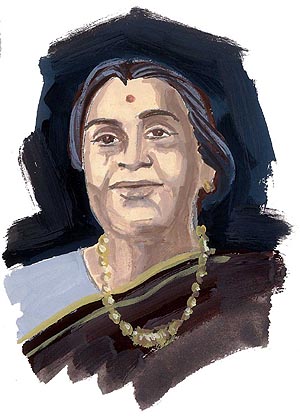BACK in the first decade of the last century, an aspiring young girl sought an appointment with Edmund Gosse, and showed him some of her poems. After giving it a careful thought Gosse said a few kind words, but added at the end: "All your poetry, in the falsely English vein, should be put in the waste-paper basket. You have no doubt mastered the English language, but you should start writing about the mountains, the gardens, and the temples." The advice was well-taken and the young poet rose to become 'the nightingale of India': Sarojini Naidu.
 The eldest daughter of a scientist-philosopher Aghornath Chattopadhyaya, Sarojini Naidu it appears inherited the gift of poetry from her mother, Barada Sundari, who was herself a poet. Her earliest poems can be seen in the archives of the National Library in Calcutta.
The eldest daughter of a scientist-philosopher Aghornath Chattopadhyaya, Sarojini Naidu it appears inherited the gift of poetry from her mother, Barada Sundari, who was herself a poet. Her earliest poems can be seen in the archives of the National Library in Calcutta.
In 1895 she left for England for higher studies on a scholarship awarded by the Nizam of Hyderabad. There she studied at King's College, London, and then Girton College, and Cambridge University. About this time she fell in love with Govindarajulu Naidu, and married him despite stiff opposition to an alliance between a Brahmin and a non-Brahmin.
Sarojni's second volume of poetry, The Bird of Time, appeared in 1912.
But those were turbulent times, and the whole nation was in the grip of revolution. When Dr Annie Besant gave the clarion call of Independence, Sarojini Naidu gave up her literary career and joined politics 1917. Leaders like Gokhale, Tagore, Jinnah, C. P. Ramaswami Aiyer, Gandhi, and Nehru shaped her political thought.
No comments:
Post a Comment